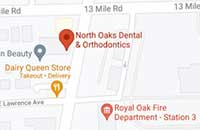Have you considered dental implants to give you back your smile? Not sure of the differences between traditional implants and mini implants?
If you’re like many people, you may have lost a tooth at some point. Or two. Or even three or more. Perhaps a mouth injury or accident cost you some of your teeth, or you may have lost teeth due to disease or decay.
It really doesn’t matter how you lost your teeth. Missing teeth can cause of a number of frustrating problems in your mouth, including:
- Difficulty in biting and chewing your food.
- Loss of jawbone mass, causing your face to look shrunken and making you appear older.
- Difficulty in speaking and being understood.
- Shifting of your other teeth, which can cause bite issues.
Dental implants can give you back your missing teeth, fill in the gaps in your smile, and eliminate all these problems.
We’re going to give you lots of great information on both traditional and mini implants, so you’ll have the facts you need to help decide which ones are best for you.
Learn the Basics of Implants
All dental implants, whether traditional or mini, essentially work as replacement tooth roots, providing a base for artificial teeth. We have several great options for topping off your implants, including crowns, dentures, and bridges.
Standard implants start with a post we surgically place into your jawbone. We’ll attach “abutments” to the post after your gums heal, which usually takes three to six months. These abutments will secure your new artificial teeth.
Mini implants are a great option if you don’t have sufficient jawbone to hold traditional implants. However, we also offer bone grafting in our office so your jawbone can support regular implants.
Mini implants are smaller than traditional implants and require less bone to fuse with. Your gums will also heal quicker with mini implants, meaning we may be able to place your new artificial teeth the same day!
Mini implants are made of one piece instead of two. There is no separate abutment to screw on top of the implant base. The top of the mini implant sticks up through your gum to secure your new teeth.
Call our Royal Oak dentist office at 248-712-1522 if you’d like to find out more about implants and how they work.
Choosing the Right Implant For Your Mouth
If your jawbone is healthy, traditional implants may work better for you. They are somewhat stronger than mini implants and may give you better performance and longevity.
However, mini implants are a good choice involving a less complicated procedure. They provide the same stable base to attach a crown, dentures, or a bridge, without the extra time and expense, especially if you need bone grafting. We can often place your mini implants and your new teeth in one easy appointment!
We have many options at North Oaks Dental to give you back your teeth and your smile, and we’ll take time to explain all these in detail to you so you can make the choice for your new implants.
Know Cost Differences Between Traditional and Mini Implants
Cost may be a big consideration for you when thinking about dental implants. In fact, it may even be the biggest deciding factor for you.
While investment costs vary depending on your individual circumstances, in general, mini implants cost around half that of traditional implants. Below are several reasons why they are less expensive:
- The procedure to place mini implants is less invasive and requires less drilling.
- Mini implants are smaller than traditional implants, so they require less raw material to manufacture.
- Healing time is less with mini implants, so fewer office visits are required.
Many factors will ultimately go into the final cost of your implant procedure. At your initial consultation, we’ll provide you full details on both kinds of implants and all the costs involved.
Get the Facts on Implant Safety and Durability
When considering your implant procedure, certainly your safety is a big factor. Both traditional and mini implants are considered safe by most experts. Your individual situation will play a big role in determining which ones are right for you, however.
If your jawbone has deteriorated because of your missing teeth, leaving you without enough bone for adequate support, traditional implants could cause the bone to fracture. They also might not properly fuse to the bone.
In this case, mini implants would be better for you. In most cases, a thin jawbone will support mini implants safely, while traditional implants could create more problems for you in the long run.
Mini implants are relatively new and have only come into widespread use within the last few years. So, their long-term durability has not been studied extensively.
Just like traditional dental implants, they should hold up for many years without problems, but they may not ultimately last as long as their larger counterparts.
In short, both traditional and mini implants offer you great options for restoring your missing teeth and getting back your great smile. We’re always happy to explain the differences between the two in more detail.
Give North Oaks Dental a call today at 248-712-1522, and we’ll schedule a consultation to see which kind of dental implants would give you the most benefits. Regain your smile and your confidence!
Visit North Oaks Dental
We can see you as soon as tomorrow!





